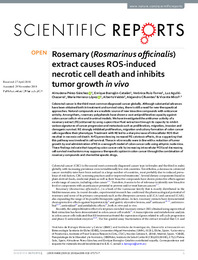Please use this identifier to cite or link to this item:
https://hdl.handle.net/11000/34377Full metadata record
| DC Field | Value | Language |
|---|---|---|
| dc.contributor.author | Pérez-Sánchez, Almudena | - |
| dc.contributor.author | Barrajón-Catalán, Enrique | - |
| dc.contributor.author | Ruiz Torres, Verónica | - |
| dc.contributor.author | Agulló Chazarra, Luz María | - |
| dc.contributor.author | Herranz López, María | - |
| dc.contributor.author | Valdés, Alberto | - |
| dc.contributor.author | Cifuentes, Alejandro | - |
| dc.contributor.author | Micol, Vicente | - |
| dc.contributor.other | Departamentos de la UMH::Ingeniería | es_ES |
| dc.date.accessioned | 2025-01-11T15:55:09Z | - |
| dc.date.available | 2025-01-11T15:55:09Z | - |
| dc.date.created | 2018-11 | - |
| dc.identifier.citation | Scientific Reports volume 9, Article number: 808 (2019) | es_ES |
| dc.identifier.issn | 2045-2322 | - |
| dc.identifier.uri | https://hdl.handle.net/11000/34377 | - |
| dc.description.abstract | Colorectal cancer is the third most common diagnosed cancer globally. Although substantial advances have been obtained both in treatment and survival rates, there is still a need for new therapeutical approaches. Natural compounds are a realistic source of new bioactive compounds with anticancer activity. Among them, rosemary polyphenols have shown a vast antiproliferative capacity against colon cancer cells in vitro and in animal models. We have investigated the antitumor activity of a rosemary extract (RE) obtained by using supercritical fluid extraction through its capacity to inhibit various signatures of cancer progression and metastasis such as proliferation, migration, invasion and clonogenic survival. RE strongly inhibited proliferation, migration and colony formation of colon cancer cells regardless their phenotype. Treatment with RE led to a sharp increase of intracellular ROS that resulted in necrosis cell death. Nrf2 gene silencing increased RE cytotoxic effects, thus suggesting that this pathway was involved in cell survival. These in vitro results were in line with a reduction of tumor growth by oral administration of RE in a xenograft model of colon cancer cells using athymic nude mice. These findings indicate that targeting colon cancer cells by increasing intracellular ROS and decreasing cell survival mechanisms may suppose a therapeutic option in colon cancer through the combination of rosemary compounds and chemotherapeutic drugs. | es_ES |
| dc.format | application/pdf | es_ES |
| dc.format.extent | 11 | es_ES |
| dc.language.iso | eng | es_ES |
| dc.publisher | Nature Research | es_ES |
| dc.rights | info:eu-repo/semantics/openAccess | es_ES |
| dc.rights | Attribution-NonCommercial-NoDerivatives 4.0 Internacional | * |
| dc.rights.uri | http://creativecommons.org/licenses/by-nc-nd/4.0/ | * |
| dc.subject.other | CDU::5 - Ciencias puras y naturales::50 - Generalidades sobre las ciencias puras | es_ES |
| dc.title | Rosemary (Rosmarinus officinalis) extract causes ROS-induced necrotic cell death and inhibits tumor growth in vivo | es_ES |
| dc.type | info:eu-repo/semantics/article | es_ES |
| dc.relation.publisherversion | https://doi.org/10.1038/s41598-018-37173-7 | es_ES |

View/Open:
s41598-018-37173-7 (1).pdf
3,37 MB
Adobe PDF
Share:
.png)
